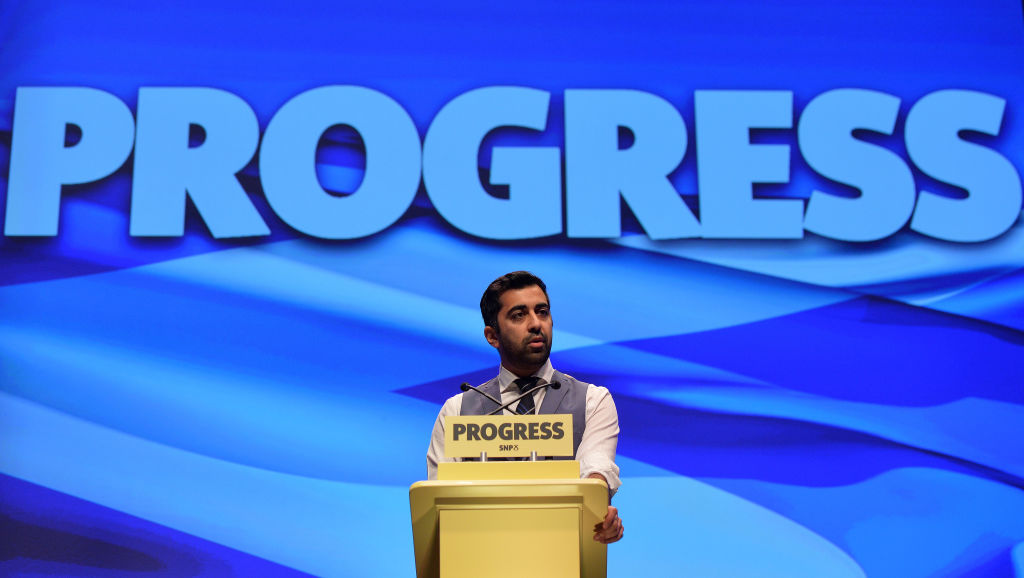The SNP’s new hate crime legislation is bad news for women. Yet the sad reality is that too many feminists have failed to speak up about the importance of free speech – and now we may all end up paying the price.
The legislation creates a new offence of ‘stirring up hatred’ on the grounds of religion, sexual orientation, age, disability, or transgender identity. But while it provides a power for Scottish Ministers to make regulations adding the characteristic of sex to this list, for now, sex is not included. This leaves women like me, who don’t agree with the emerging gender identity ideology, in danger of being targeted.
It is also not hard to spot the inconsistency with the legislation: males who wish to identify as women will be offered additional protections under the law; but those born female will not benefit in the same way. Of course, trans-identified people should be protected from abuse and discrimination. But why not women too? Does the SNP think the minority of individuals who choose to identify as transgender are much more at risk than women and girls? Women suffer disproportionally as victims of rape, domestic abuse, FGM, child marriage, and femicide around the world, yet in Scotland this seems to count for little.
To be fair, not all members of the SNP are on board with the new law. The party’s MSP Joan McAlpine has spoken out in opposition:
It is not hard to spot the inconsistency here
‘The thing that finally turned me to my current position was the government’s decision to expand the definition of transgender identity to include cross-dressers who are not trans-identified … It will seem bizarre to many people that men who enjoy cross-dressing are protected from hate crime, but women are not.’
A number of female MSPs and women’s organisations in Scotland have also voiced their objections. For Women Scotland said this new legislation could mean voicing opposition to gender identity ideology itself is now framed as ‘hate’ and criminalised as a result. This is bad news for feminists: in recent years, those who have challenged gender identity ideology have been labelled as hateful. Harry Miller, a former police officer from Humberside who was investigated by the police over tweets, is just one high-profile example.
In the end, though, the voices of protest counted for little; Scotland’s parliament overwhelmingly approved the legislation last week. And now women in particular could pay a heavy price.
As well as the problem with the lack of protection given to women, there’s also another broader issue with the hate crime bill. The focus on particular ‘identities’ deemed to be marginalised and therefore in need of protection from ‘hate’ could ultimately lead to the widespread curtailment of free speech.
The reality is that often ‘hate’ is a matter of opinion. I personally view the word ‘TERF‘ (trans exclusionary radical feminist) as one that exists to vilify, discriminate against, and target women with violence and harassment. Based on standard definitions, the word could count as hate speech. But my view is that we don’t need protection from words so long as we are free to respond with our own words. But will this new law allow Scots to do that?
As feminists wake up to the fact that they are now plausible targets of censorship, too many are failing to see and address the bigger picture. It’s vital that if we want to protect our own speech, we need to protect all speech — even speech we might view as ‘misogynist’, ‘racist’, ‘Islamophobic’, or otherwise offensive to our sensibilities (including the speech of those deemed to be ‘conspiracy theorists’, ‘anti-vaxxers’ or anti-abortion activists) and political views.
Bad, hateful, stupid, offensive speech might be upsetting — even harmful. But it is surely better to have the chance to discuss such ideas and words openly than live in a world where some topics of conversation, ideologies, beliefs, or arguments are off the table entirely?
While criminal acts should indeed be criminalised, no matter who the victim is, singling out protected groups based on identity has led to the Orwellian climate we face. Now, there is a danger that challenging certain ideas or sharing controversial opinions could be deemed to be ‘hate’ or ‘abuse’.
Feminists need to recognise that the problem is not simply that women are not included in this kind of legislation, but that labelling speech as ‘hate’ in a legal sense is the problem. Some feminists have demanded social media companies police anti-feminist or misogynist speech, only to end up on the receiving end of censorship when they wish to challenge gender ideology.
Is the announcement that misogyny will be recorded as a hate crime by police in England and Wales – which has been celebrated by campaigners – really a good thing? While it might offer some extra protection to women, this kind of hate crime obsession is likely to backfire.
Too many feminists have failed to stand up for the speech of our political adversaries. I regret my own failure to do just that in the past. But the Scottish hate crime bill, which could easily be replicated in other countries, shows the danger of not speaking up for those we disagree with. Free speech is simply too important to allow that to happen.





Comments